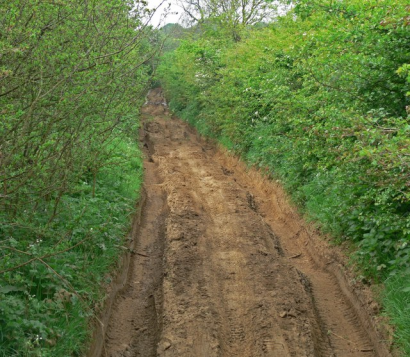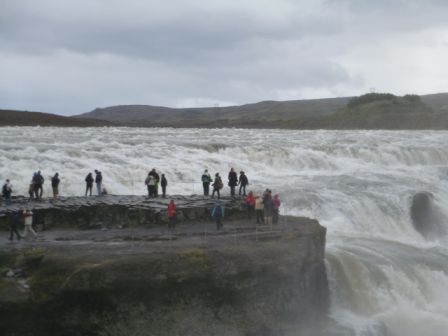Historically, I’ve considered curiosity among the list of core virtues. I’m drawn to those who demonstrate the quality; I aim to cultivate it in myself. When we wonder—or wander—about the world with open, welcoming eyes, we see differently. Life gains a vitality, a playfulness, a sense of possibility. Curiosity leads us to learn, to grow, and to improve. All good, all good. Or, at least, so I had thought before this week.
A few days ago, I read a collection of New Year’s Resolution lists written by a small range of celebrities. Woody Guthrie’s 1942 list covered a bunch of bases, ranging from the mundanely hygienic (“Take bath” and “Wash teeth if any”) and the intellectually stimulating (“Read lots good books”) to the family-supportive (“Love Mama. Love Papa. Love Pete.”) and politically-charged (“Help win war—beat fascism,” and “Wake up and fight”). Marilyn Monroe’s 1959 list ached for a desire to lift herself out of self-limitation, ending with “try to enjoy myself when I can—I’ll be miserable enough as it is.” All proved fascinating, offering unusual glimpses inside.

Like Scooby-Doo here, I was a bit confused when I read Sontag’s resolution.
…..
Image courtesy of Scooby Doo Facebook fan page.
Of all the interesting snippets, however, one from author Susan Sontag’s 1972 list stood out in particular: I will try to confine my reading in the evening. (I read too much—as an escape from writing.) My head tipped in a Scooby-Doo confusion. Aroo?!? Read ress!?! Reading is one of the most powerful expressions of curiosity, a direct avenue into new worlds and opening minds. What the heck was she thinking?
I have always loved to read. I started at the age of three—right around the time Sontag was making her resolution actually—by going through the sports pages with my older brother and rarely looked back from devouring more. World Book encyclopedias. Time-Life compendia covering the Great Wars, American westward expansion, or the scientific wonders of the world’s oceans. The collection of Newsweeks and National Geographics shelved in the basement of my Mom’s office building, colorful documentaries that stretched back through years of wonder. I wanted to take it all in, to know everything.
Such voraciousness served me well as a child and as a young man. I always enjoyed school, never seeing it as a burden but instead welcoming it as an invitation. I suspect it’s part of why I love teaching now. Especially at a private, independent school, our community thirsts for development. Learning defines our success. Curiosity drives our engines. The more I learn, the more I bring to the classroom. I can see it in my students’ eyes that my teaching comes alive.Now that I’m trying to write more regularly, however, I’m also aware that, like Sontag, I’d do well to turn down—and even turn off—the incoming spigot from time to time. The pace of my posting here has dwindled over the last two months and that has frustrated me. I could lean on several excuses if I wanted to: I returned home after several months away and needed to catch up on unattended matters; the holiday season brought its usual whirlwind of shopping and family travels; and Melissa and I took in a three-legged foster dog—and have come to find that he unexpectedly has not been previously housetrained. Sure, these factors have contributed to my lag in production, but they’re not the main culprit. More directly, it’s the never-ending stream of seeking—a caffeinated curiosity looking for the next thrill—that serves as procrastination.
Though I don’t often get the chance to just sit and read in a leisurely way any more, I do still read tons. As in my childhood, Newsweek, National Geographic, and sports magazines keep me up-to-date. Alumni magazines, updates from non-profits we support, missives from the many networks we’ve joined: every day brings more compelling material to my mailbox, both physical and electronic. Most powerfully, of course, I wander into the never-ending kaleidoscope of the internet. I just need to check the news or I just want to see the scores, I say, before getting sucked in for hours. Humorous lists. Celebrity hijinks. Consumer comparisons. Add in videos of sports highlights and adorable kittens and it ain’t pretty. In fact, it’s a wonder I can get off the computer at all. For sure, the curiosity virtue crosses into a distraction vice.
Even as it’s happening and the more responsible parts of me suggest getting back on target, a bit of self-righteous defensiveness raises up: It’s not a bad thing to learn about the world. How could that be wrong? Just five more minutes.” It’s those last four words that expose the ruse, however. Just five more minutes becomes another five minutes on top of that. The seeking function, truly a virtue in many settings, takes on an addictive quality that steamrolls over other priorities. Each little exploration—justifiable in isolation, perhaps—adds to the next and hours slip away. I’ve avoided the challenge of putting pen to paper or fingers to keyboard. When I feel frustrated for not having written more, I often turn back for more distraction. The cycle snowballs: the more exasperated I get, the harder it becomes to actually start.[1]

Even the path of curiosity can become a rut that leads nowhere.
…..
Image courtesy of Wikimedia Commons.
I know others struggle with procrastination as well. For many, such stalling takes another form than reading or curious exploration. Some clean. Others sort. Still others exercise. Whatever the diversion, I’m not alone in turning a virtuous path into a rut. Perhaps it’s just that resolve is weak and temptation strong, but I sense something more at work. I think we resist the deeper calling because it scares us to get real and get big. We’re more powerful and we’re more vulnerable when we’re taking the risk of our real work—and we somehow manage to fear both sides of the same coin. Marianne Williamson’s prayer from A Return to Love often comes to mind when I get to such internal struggles. I’d do well to post it at home as I post it in my classroom:
Our deepest fear is not that we are inadequate. Our deepest fear is that we are powerful beyond measure. It is our light, not our darkness that most frightens us. We ask ourselves, Who am I to be brilliant, gorgeous, talented, fabulous? Actually, who are you not to be? You are a child of God. Your playing small does not serve the world. There is nothing enlightened about shrinking so that other people won’t feel insecure around you. We are all meant to shine, as children do. We were born to make manifest the glory of God that is within us. It’s not just in some of us; it’s in everyone. And as we let our own light shine, we unconsciously give other people permission to do the same. As we are liberated from our own fear, our presence automatically liberates others.[2]
I recognize that mastering the discipline of writing will help bring my best to the world. And I also see that runaway reading and seeking gets in the way of such mastery. That said, I have no intention of shutting down my curiosity as whole. Even if I wanted to, I couldn’t.
My work now, perhaps, lies in training it, harnessing it, and honing a focus that moves in alignment with larger, deeper goals. To a great extent, that’s been the work—and the joy—of this sabbatical so far, turning the lens of my seeking onto the ideas and topics that most interest me rather than on those that just happen to cross my doorstep or desktop. Each day of this year gives me another chance to choose and strengthen that focus. And every time I turn the spigot off, even just for a bit, I reaffirm my commitment to that something deeper.
Curiosity still shines brightly as a virtue in my world. Thanks to Susan Sontag’s list, I’m now more aware of the shadow it throws as well. I look forward to the added relief and depth of this new resolution.
[1] I recognize, too, the delicate challenge of writing a blog, in particular. In order to post any thoughts, I need to get on my computer. Even if I turn my wireless signal off while actually writing—no e-mail, no internet—I still have to connect before actually posting. That’s like asking an alcoholic courier to make a delivery in the backroom of a saloon. Oh, just pass right on through to drop it off. You’ll be fine.” Even if I make it safely in one direction, the return trip back out from WordPress can trip the cycle again. I’ve never done drugs or gotten into alcohol and I don’t eat sugar, but I’d say I still inherited my grandfather’s addictive brain chemistry.
[2] This quotation often gets misattributed to Nelson Mandela’s first inaugural address. Not only did he not write it, he didn’t even cite it during that speech. It does seem like it would fit though. The actual source is Marianne Williamson’s A Return to Love: Reflections on the Principles in A Course in Miracles, Harper Collins, 1992. From Chapter 7, Section 3 (Pg. 190-191).




